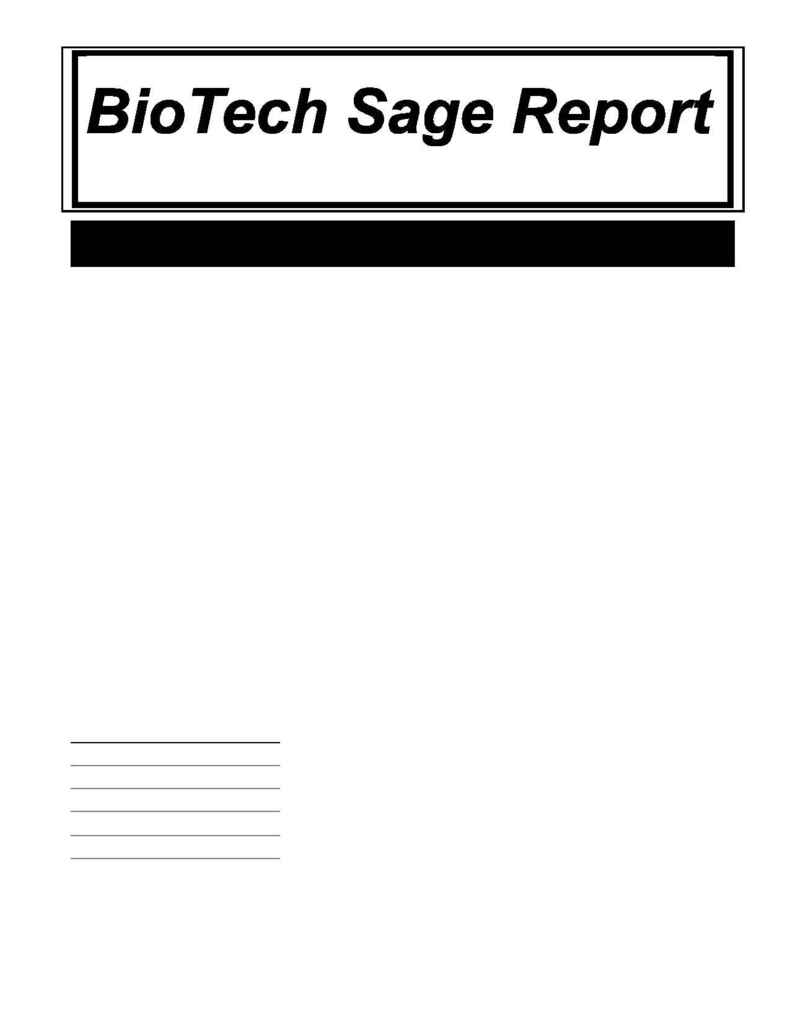
1
The year 1999 has been good for
the biotech industry as the Nasdaq
biotech index has gained 108% for the
year and has reached record highs.
With stock prices climbing for a num-
ber of biotech companies, it appears
that this sector maybe entering the
golden age of biotech. BioTech Navi-
gator (BTN) envisions several bio-
tech firms reaching levels of success
never achieved in the past. There is
no doubt about it, hot news and intro-
duction of new products, earnings,
mergers and acquisitions, and func-
tional genomics has fueled this sec-
tor's momentum.
The pharmaceutical industry is
now faced with a tremendous di-
lemma. If companies are going to
continue the growth rate that they've
produced historically, they will need
to build up their product pipeline. One
potential way to achieve this goal is
by consolidation/mergers. Talks of
merger between American Home
Products (AHP) and Warner-Lambert
(WLA) has been received positively
by Wall Street and more recently
Monsanto (MTC) and Pharmacia and
Upjohn (PNU) have discussed a
merger. Mergers in this industry are
inevitably and will help keep Big
Pharma operating and sustaining the
increasing cost of research and devel-
The investment newsletter that provides the investor with the essential information necessary to wisely
invest in biotechnology securities.
Volume 3, Issue 11
January 2000
To order, call (503) 649-1355
Itching for a Cure
Do you like having a nagging
itch that burns? No. Well, just be
thankful that you're not one of the 1-2
percent of the United States popula-
tion or about 5.5 to 7 million people
that have psoriasis. Psoriasis is a
chronic skin disease characterized by
scaling and inflammation. Scaling
occurs when cells in the outer layer of
the skin reproduce faster than normal
and pile up on the skin's surface. Al-
though the disease occurs in all age
groups and about equally in men and
women, it primarily affects adults.
People with psoriasis may suffer dis-
comfort, including pain and itching,
restricted motion in their joints, and
emotional distress. Psoriasis is a
growing healthcare problem, as be-
tween 150,000 and 260,000 new cases
of psoriasis occur each year. Accom-
panied with this is a rising cost esti-
mated at $1.6 to $3.2 billion that is
sure to continue to escalate in the ab-
sence of an effective treatment.
What is psoriasis and what
causes it?
In its most typical form, psoriasis
results in patches of thick, red skin
covered with silvery scales. These
patches, which are sometimes referred
to as plaques, usually itch and may
burn. The skin at the joints may
crack. Psoriasis most often occurs on
the elbows, knees, scalp, lower back,
face, palms, and soles of the feet but it
can affect any skin site. The disease
may also affect the fingernails, the
toenails, and the soft tissues inside the
mouth and genitalia. About 15 per-
cent of people with psoriasis have
joint inflammation that produces ar-
thritis symptoms. This condition is
called psoriatic arthritis.
Recent research indicates that
psoriasis is likely a disorder of the
immune system. Medical research
scientists believe that, in psoriasis, an
abnormal immune system causes in-
Bio Analysis
1-5
Bio Pool Stocks
6-7
Company Bios
8-11
BioTech Stock Update
12-18
Bio Portfolio
19
Bio Indices
20
BioScope
Biotech 2000
Turn to page 2, column 1
Turn to page 5, column 2
